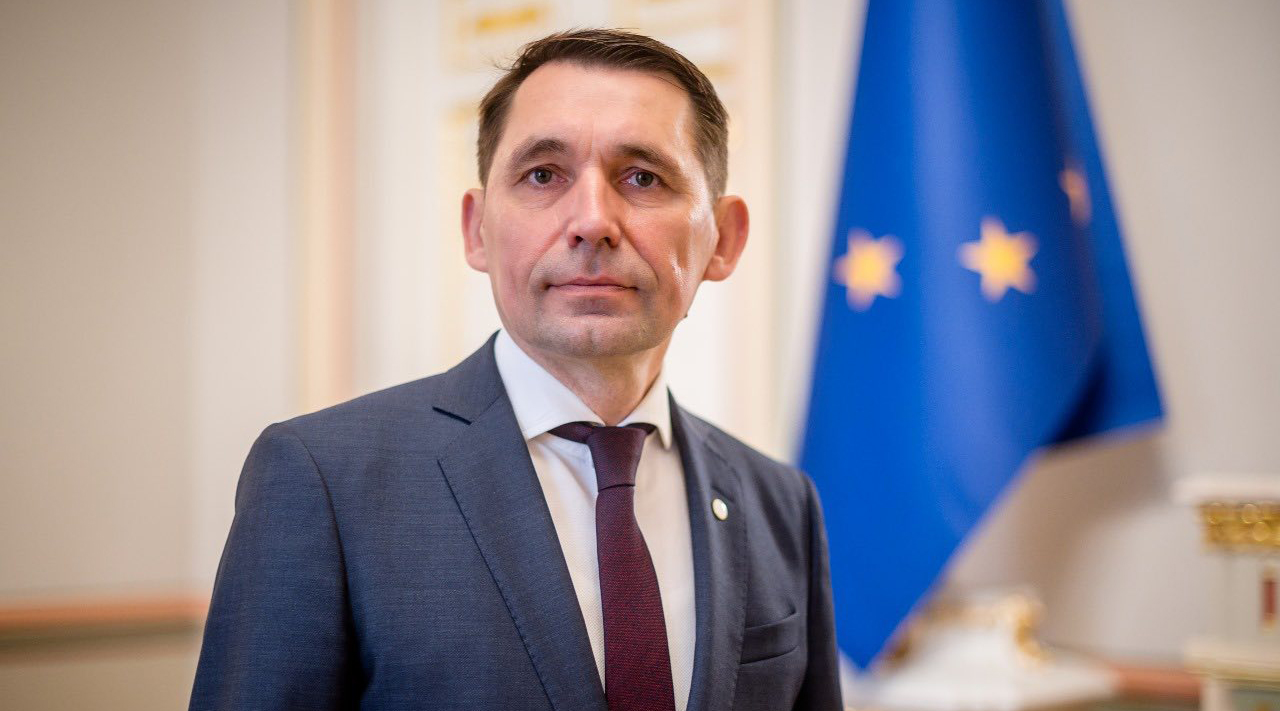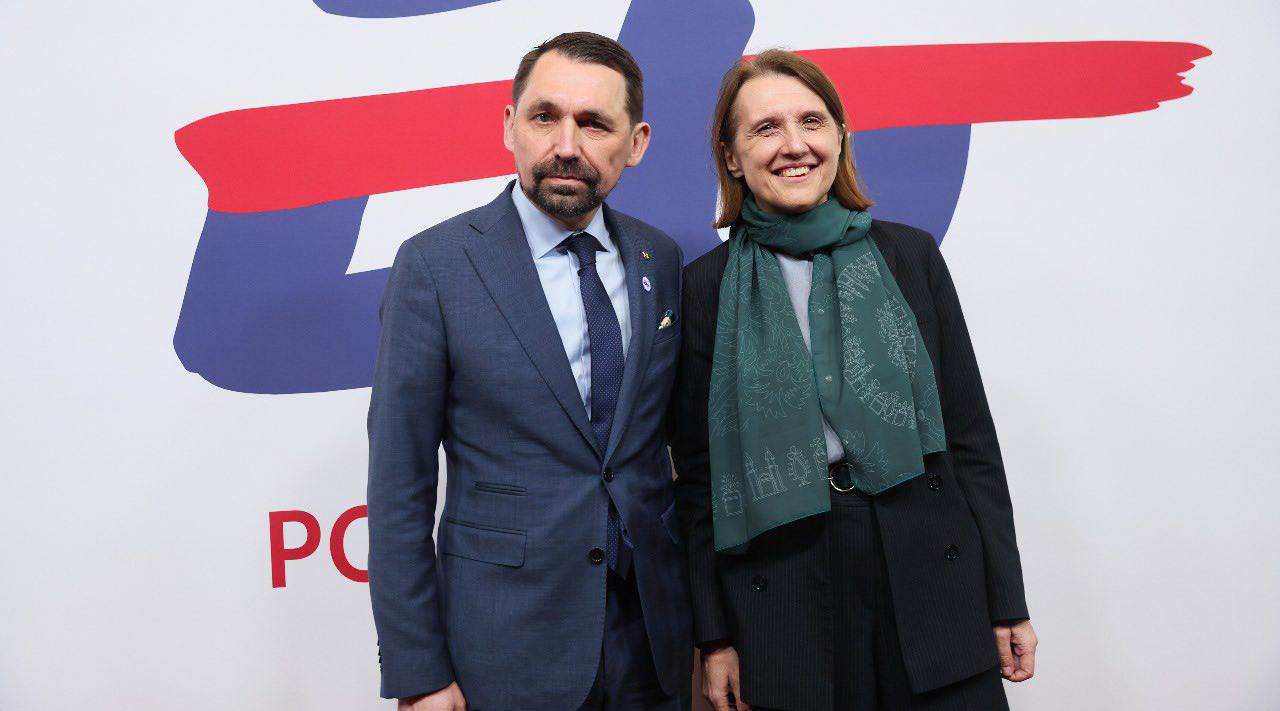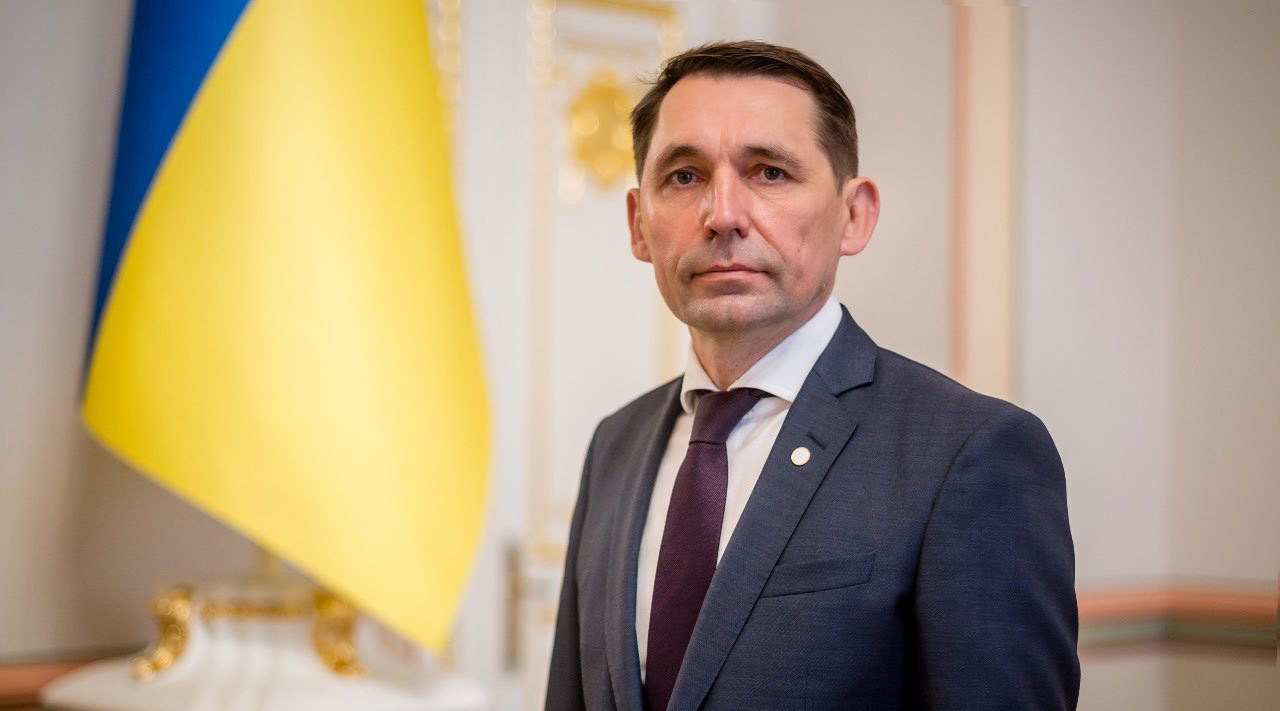On April 7-8, Warsaw hosted an unofficial meeting of EU culture ministers, attended by the Ukrainian Minister of Culture and Strategic Communications (MCSC), Mykola Tochytsky, at the invitation of the Polish European Union Presidency.
Ukrinform requested Mr Tochytsky an interview to discuss the outcomes of his meeting with European counterparts, with a focus, in particular, on the need to step up effort to preserve Ukraine's cultural heritage and to prosecute Russians for their theft of cultural artifacts from the Ukrainian territory they currently occupy. The Minister furthermore shared information about the Ukrainian-Polish dialogue related to the search for and exhumation [of Polish victims of the WWII Volhynia Tragedy], as well as about the support being provided for the media outlets operating in frontline-adjacent regions and the work getting underway to recover and rebuild the cultural heritage sites damaged by Russia’s war in Ukraine.
RUSSIA IS PERSISTENTLY AND DELIBERATELY DESTROYING UKRAINE'S CULTURAL HERITAGE
- Mr. Minister, you attended the informal meeting of EU ministers of culture in Warsaw. What issues did you raise with your European counterparts, and which of them have been resolved?
-The ministerial meeting was unofficial. Alongside me, colleagues from several non-EU countries were present, including the UK, Norway, and Iceland.
The topic of discussion was extremely important, as the work was done towards the development of the platform launched in pursuance of Ukraine’s Internal Resilience Plan, presented by President Volodymyr Zelensky in his speech at the Verkhovna Rada of Ukraine in November last year, in particular its Point No. 9 on “Cultural Sovereignty”.
The point at issue is that Ukrainians should provide the world with an understanding of who we are, why and what we are fighting for. Indeed, each of us understands that not just Russia is seeking to seize our territory and kill peaceful people, but it is persistently and deliberately destroying Ukraine’s cultural heritage. One million seven hundred thousand items of our cultural heritage have been stolen from Russian-occupier regions, ranging from archaeological artefacts to museum collections, which the Russian Federation appropriated for itself in violation of all the existing norms of international law. Whereas the Russians stole our name and our history in ancient times, were removing the exhibits to the Hermitage Museum and museums in Moscow, they are now selling them with no restrictions on the black market.
Thanks to cooperation with colleagues from different foreign countries, we are gradually returning these values. In particular, over and over again during foreign visits - both by the head of state and mine – relevant authorities in foreign countries have handed over to us seized artifacts that had been stolen from Russian occupied regions and removed abroad for selling on the black market.

- Are these Russian military looters who are doing that?
- They are doing that and more. Russian cultural figures too are doing that. Actually, that is why we launched a platform to address the issues and immediate needs of protecting our cultural heritage. In February, the inaugural international conference on culture was held in Uzhhorod, which was attended by 29 delegations, including from the European Commission and UNESCO, twenty of which were represented at the level of ministers and deputy ministers of culture.
And already today, during this meeting in Warsaw, thanks to the highly professional work of my Polish counterpart, Anna Wroblewska, the Polish EU Presidency suggested an explicit plan on the development of the platform launched in Uzhhorod. It is about assisting Ukraine, and through this, also assisting European countries to understand what regulations should be in place to ensure successful preservation, protection or evacuation of cultural heritage that may come under fire or be subject to destruction during military conflicts.

I was the keynote speaker on this topic and revealed the main tasks facing us. The point at issue is that we, at this time, are requesting our colleagues to help us in the evacuation of cultural artifacts, as well as in the training of specialists in the fields of evacuation, restoration, and recovery. Incidentally, we have managed to evacuate over half a million cultural artifacts from 59 cultural sites located in frontline-adjacent areas to 21 museums throughout Ukraine.
Like I said already, Russian officials are also involved in the theft. Ukraine imposed its first sanctions against cultural, museum, and other figures in Russia in February. These are 55 individuals and three legal entities, with respect to which we have clearly proven evidence of their involvement in the theft, demolition, and destruction of Ukrainian cultural heritage.
Furthermore to this, as part of the platform’s efforts, we are also consulting with the EU countries and our partners from countries outside the EU about what needs to be done, what regulations and capabilities a particular country should have in order to have in place repositories for preserving artifacts. It should be appreciated that a repository for artifacts is a very specific facility that must meet the relevant standards in terms of security, safety, and climatic conditions for storing historical objects.
We also addressed the issue of digitizing cultural heritage, which is a huge problem not only in Ukraine, but also in many other countries. Why? Because when we talk about the Russian Federation trading in our cultural heritage, this is not only happening now. Wars show that this kind of trade will continue into several decades after they end. And in order to prove your ownership of a property, you need to have in hand clearly drawn up catalogs and registers. We are currently carrying out such work. To date, we have digitized 10-15 percent of the artifacts contained in Ukraine’s museum fund. In cooperation with foreign partners, we have already been able to digitize 400 objects of immovable cultural heritage. The Ministry has also launched work on the strategic project with Google “Ukraine is Here”, as part of which more than 8,000 exhibitions and collections from Ukrainian museums have already been digitized. However, we lack experts and professionals in this field, since lots of guys and girls are currently at war, and we are also lacking in adequate funding.
That being said, the next step will be the presentation of our Culture Development Strategy 2030, which has been recently endorsed by the government, at the Ukraine Recovery Conference due in Rome in July, along with the list of priorities for the creation of the Ukrainian Heritage Fund, which will help us handle these tasks.
We are currently also requesting our colleagues, including Polish ones, to help us with exhibitions of works of art from our museums. In this way, not just we spread the word about Ukrainian culture, but also secure the integrity of our collections.
UKRAINIAN ART COLLECTIONS ARE ON DISPLAY IN ALMOST 15 EUROPEAN COUNTRIES
- An example is Khanenko Museum exhibition at the Royal Castle in Warsaw…
- Yes, this is one of the largest and best collections in Ukraine, and I am proud that this was how our Polish colleagues appraised it. Since the beginning of the full-scale Russian invasion, 162 collections have been removed from Ukraine for restoration and display abroad. Currently, lots of Ukrainian art collections are on display in 15 or so countries, including Poland, Sweden, Denmark, the Netherlands, Lithuania, Belgium. Almost every EU country is helping us with this while we are building storage facilities. Incidentally, these facilities could be used for dual purposes: at times of war they can shelter people, and, after the war, can be used for storing our artifacts.
- How did your European colleagues respond to your initiatives and suggestions?
- The EU Commissioner for Intergenerational Justice, Youth, Culture and Sports, Glenn Micallef sent a questionnaire to his fellow ministers with an explicit request: to answer which of the tasks raised by Ukraine’s Minister of Culture they can respond to. For example: to preserve exhibitions’ integrity, provide funds, help with the training of Ukrainian restorers, experts, etc. The European Commission will serve as the information hub where all the information will be sent and centralized. As of today, we have a clear response from European Commissioner Micallef, and with the help of our colleagues from the European Commission, we will be able to manage the processes and understand where, with whom and how we will work on these issues in the future. At the next meeting of the EU Ministers of Culture, there will already be some specifics on this matter.
- Mr. Minister, last December, a Ukrainian-Polish working group was set up to address complex challenges in bilateral relations. What results has this working group achieved so far?
- Our teams are working in a harmonious and professional way. Three working group meetings have been held so far, the latest meeting took place on March 30. We exchanged lists of places where we would like to conduct search, research, and exhumation work.
As a result, for now, based on the parity principle, we have one positive response from each of the Ukrainian and Polish sides regarding the carrying out of such work.
After the first search or exhumation work is carried out, we, together with our Polish colleague, will issue a statement and tell the societies of both countries in detail about the results.
- When will the work begin in these places on both sides of the border?
- All logistical issues regarding both places are currently being discussed in detail, along with issues regarding who will take part in this work. I think it will be soon we will report on everything. Our standpoint is that everything should take place in compliance with international law and in conformity with national legislations.
- In Ukraine, these works will be getting underway at the time the war is in its active phase. How to ensure the people participating in the work are safe and secured, particularly against acts of subversion or sabotage?
- The issue of security is absolutely critical, and both countries must work toward this end. When I spoke about a professional and competent approach to the activities of our groups, we also discussed this issue too. We will guarantee the safety and security for the people who will be engaged in these works, but I will not provide the details yet.
- The first two permits are already there. Should we expect more permits for search and exhumation works to be issued during this year?
- We are working on this issue, this is a two-way path.

UKRAINE, EU NEGOTIATING POTENTIALITIES AND POSSIBILITIES OF SUPPORT FOR REGIONAL MEDIA
- Last week, the Ministry announced a competition to launch newspapers for residents of frontline-adjacent and recently liberated communities. Why is this project important? In your opinion, how effective is information work with the population in near-the-frontline and recently liberated regions?
- This aspect is of crucial importance. We have been in continuous dialogue with people and regional media in these regions. It is worth noting for that matter that some locations in these regions have no Internet access. Secondly, USAID, which used to help regional media professionals a lot, has been shut down in Ukraine. At a meeting with European Commissioner Micallef, we discussed how to fill up the gap with funding from European funds, which was previously provided by the United States. Recently, 10 million euros has been appropriated in support of non-aligned media outlets, and we will continue working along this line. The state leadership and the government will do everything they can to ensure that our regional printed outlets are able to continue their work. Failing this, it is going to be pretty difficult to pursue any meaningful information policy.
- The Ministry has recently updated statistics on the number of cultural heritage monuments and cultural infrastructure facilities that have suffered due to Russian aggression. How do you assess the current status of international cooperation, most particularly with UNESCO and foreign embassies in registering and documenting crimes, highlighting the extent of these crimes and in developing a strategy for the recovery and reconstruction of these objects?
- We have maintained a very effective and very good cooperation between the Ministry of Culture and Strategic Communications and the Prosecutor General's Office. It is very good news that a specialized unit has been set up within the Armed Forces that is engaged not only in documenting the crimes, but also in facilitating evacuation, as well as in research alongside professional specialists who are serving in the Armed Forces ranks.
A very important element to this effort, like I’ve said already, is digitization of Ukraine's cultural heritage. This without, it will be difficult to talk to international partners, including UNESCO, EU countries and all other countries of good will, about how to help us. That’s to say, we have to do our homework. After the dossier is properly compiled, it will be handed over to our international partners.
We are currently working quite effectively with UNESCO and other international institutions working for the protection and preservation of cultural heritage in order to register and document these crimes and transfer the cases to relevant international courts in the future. This will give us the right to protection in international institutions.
Of the extensive list of cultural heritage sites under UNESCO protection in Ukraine, two have sustained damage from Russian attacks so far. In particular, we are talking about the Derzhprom building in Kharkiv, as well as the David Oistrakh Philharmonic in Odesa. This strike left 16 sites damaged in Odesa, including the Bristol Hotel and the Odesa National Opera. That is, our mission is to register, transfer, digitize and apply to international courts. We are satisfied with how cooperation with international partners is proceeding at this stage in time.
- The St. Nicholas Roman Catholic Church in Kyiv sustained damage from falling debris during a Russian missile attack on Kyiv in December last year. When can this religious building be restored? Are international partners, in particular UNESCO, are expected to participate?
- This issue is of huge significance because the St. Nicholas Roman Catholic Church is of great importance in terms of preserving our cultural heritage. The problem with the Church cannot be solved solely by funding from UNESCO. There must be a comprehensive approach to this issue, we must restore everything. A fully-fledged restoration will take funding, and it will take quite a while to raise it. We are in contact with international partners, not only with UNESCO, so that this object is included into the Ukrainian Heritage Fund for subsequent restoration.
This object is on a priority list for fully-fledged restoration so that the Roman Catholic community can use it. On the other side of the coin are 5,483 cultural and tourist infrastructure sites that have been reduced to ruins or sustained damage due to Russia’s war of aggression. The Ukrainian government, the World Bank and the United Nations have estimated that Russia has caused USD 3.5 billion worth of damage to Ukraine’s cultural sector. No country in the world would be able to restore everything at once. This will take some time.
Interviewed by Yury Banakhevych, Warsaw
Photo Credit: Ministry of Culture and Strategic Communications
Photo Credit: Ministry of Culture and Strategic Communications
